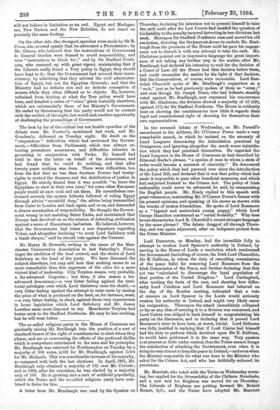The best by far of the critical but not hostile
speeches of the debate were Mr. Forster's, mentioned last week, and Mr. Goschen's, delivered on Tuesday night. He dwelt on the " stupendous " difficulties which had environed the Govern- ment,—difficulties from Parliament, which was always ex- torting premature assurances, and difficulties inherent in governing in conjunction with Turks. He himself had tried to face the latter on behalf of the Armenians, and had found that he could do nothing, and that after twenty years nothing was done. There were difficulties, too, from the fact that no less than fourteen Powers had treaty- rights to control the finances and the distribution of justice in Egypt. He utterly denied that it was possible "to leave the Egyptians to stew in their own juice," for some other European people would at once cook and eat them. He nevertheless con- demned severely the system hitherto followed of ruling Egypt through advice "sevenfold deep," the advice being transmitted from Cairo to London and back again, and so on, and demanded a clearer assumption of responsibility. He thought the Govern- ment wrong in not assisting Baker Pasha, and maintained that Europe had devolved on us the mission of defending civilisation against a wave of Mussulman barbarism. He believed, however, that the Government had taken a new departure regarding Tokar, and altogether declining "to trust Lord Salisbury with a blank cheque," said he should vote against the Censure.


































 Previous page
Previous page